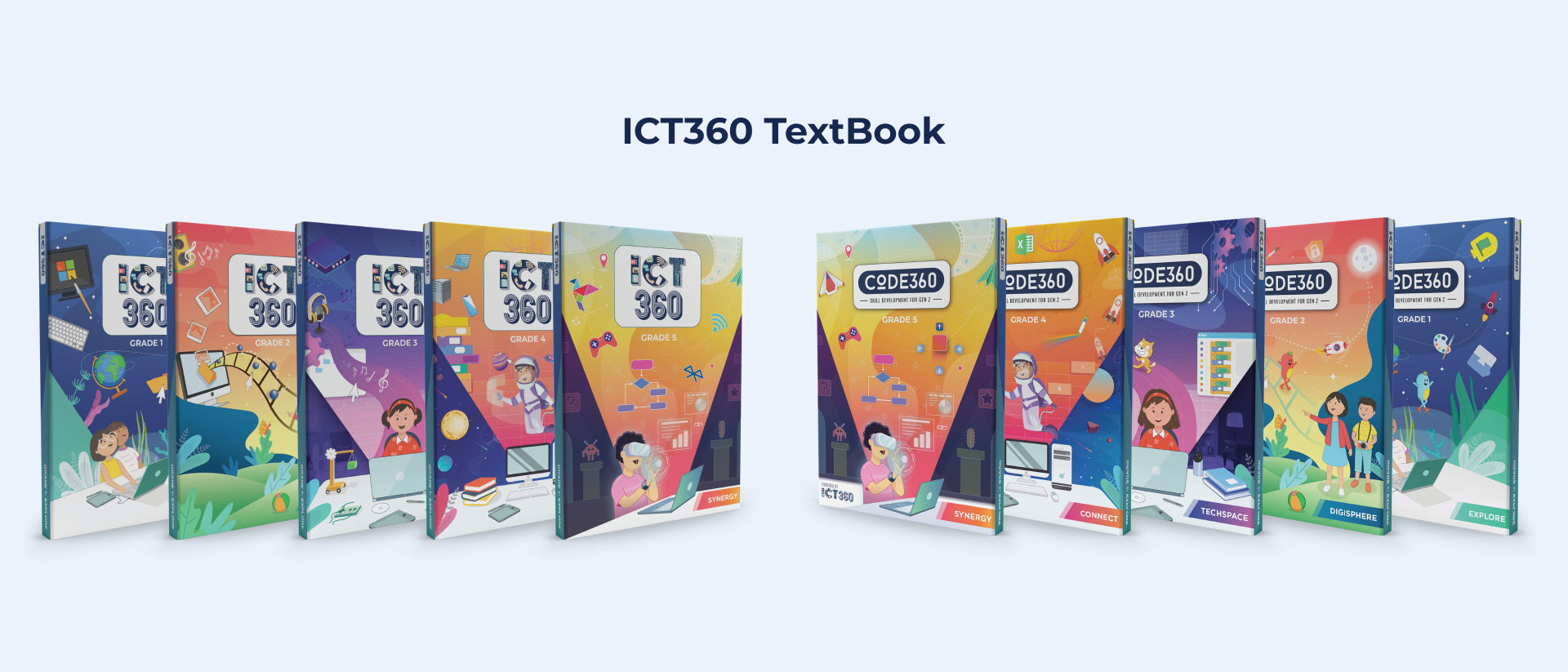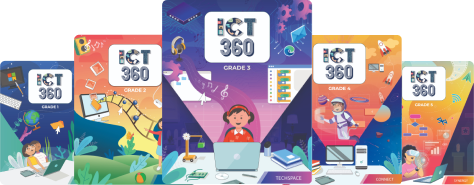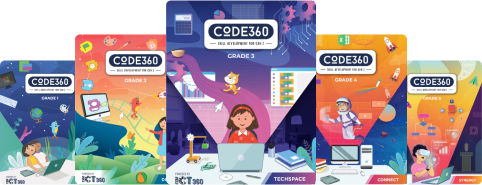Most Advanced Computer Science ICT Curriculum Textbooks
The ICT360 books offer a comprehensive curriculum for grades 1 through 10, designed to align with National Education Policy (NEP) as well as international technical educational standards.
The curriculum progressively equips students with technology concepts, real-world applications, digital citizenship principles and future technologies. By blending theoretical knowledge with hands-on activities, the books aim to cultivate essential 21st-century skills, preparing students for higher education and future careers in technology.
Grade 1
ICT360 Grade 1 is the first book in this series, designed to help kids start their journey of ICT curriculum. It covers the fundamentals of computers, including their components and basic operations, alongside essential skills like using a mouse and keyboard. The book also explores the internet, emphasizing safe practices. In addition, students are introduced to creative and interactive aspects of technology, such as digital art, and multimedia. The programming and introductory Artificial Intelligence lessons cultivate logical thinking and problem-solving skills, offering students a glimpse into cutting-edge technologies.
By the end of the course, students will have a solid foundation in understanding and using technology, preparing them for more advanced studies in subsequent grades.
Skills Alignment
Sensory Motor Co-ordination, Colour Differentiation, Colour Co-ordination, Observation, Interpretation, Logical Thinking, Visual Communication, Visualization, Composition
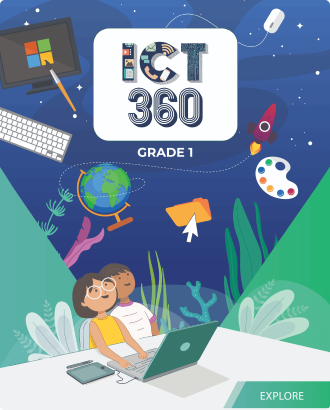
Tools & Technologies

Windows

Notepad

Browser
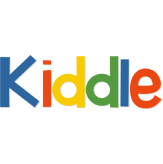
Kiddle

ScratchJr

Paint

Autodraw
Grade 2
In Grade 2, students build on their foundational knowledge by learning about computer peripherals and desktop navigation. They delve deeper into the use of the internet for educational purposes and learn the importance of passwords to enhance online security. The digital painting module becomes more advanced as students create more detailed digital art.
They explore visualization and animation concepts to create simple animations and stories. The curriculum also introduces storytelling through block coding, allowing students to design interactive narratives and games. Multimedia skills are expanded with audio and video exploration, and students gain a broader understanding of Artificial Intelligence and its applications in daily life.
Skills Alignment
Sensory Motor Co-ordination, Colour Differentiation, Colour Co-ordination, Observation, Sequencing, Interpretation, Logical Thinking, Logical Reasoning, Global Awareness, Expressions, Listening Skills, Visual Communication, Pattern Recognition, Visualization, Ideation, Imaginative Thinking, Composition
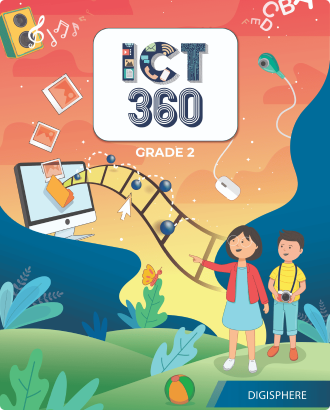
Tools & Technologies

Windows

Notepad

Browser

Kiddle

Tux paint

Wick Editor

ScratchJr

Media Player

Quick Draw
Grade 3
Grade 3 continues to build on basic computer skills with a focus on exploring the computer system and basic troubleshooting techniques. Students learn about internet browsing and network basics, including how to use browser. Digital citizenship is reinforced with lessons on responsible online behavior.
They create and edit digital documents, learning to format and organize information effectively. Advanced animation techniques are introduced, along with fundamental coding concepts. Students also engage in multimedia projects like video editing, and they are introduced to the concept of Artificial Intelligence and its role in technology.
Skills Alignment
Sensory Motor Co-ordination, Colour Co-ordination, Observation, Problem Solving, Sequencing, Interpretation, Spatial Awareness, Logical Thinking, Logical Reasoning, Analysis, Global Awareness, Expressions, Listening Skills, Visual Communication, Aesthetic Sense, Visualization, Composition
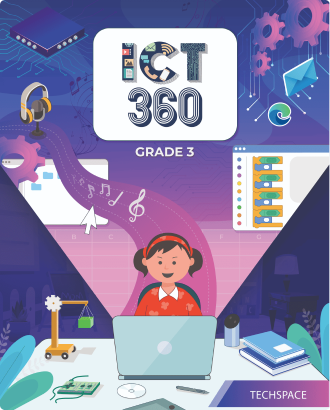
Tools & Technologies

Windows

Browser

Scratch

MS Word

Wick Editor

ScratchJr

Video Editor

AI Story Generator
Grade 4
In Grade 4, students deepen their understanding of computer systems by learning about the system unit, operating systems, and file management. They explore web browsers and learn about internet navigation and etiquette. Graphic design concepts are introduced, including vector graphics and geometric shapes.
Students enhance their digital documentation skills with advanced text editing and layout design, creating professional-quality documents. They also learn to create presentations as an effective tool for visual communication. The curriculum includes an introduction to data analysis using spreadsheets and visual programming through interactive games. Students are introduced to the evolution of Artificial Intelligence and its impact on technology.
Skills Alignment
Sensory Motor Co-ordination, Colour Co-ordination, Observation, Problem Solving, Sequencing, Interpretation, Spatial Awareness, Logical Thinking, Logical Reasoning, Analysis, Global Awareness, Expressions, Listening Skills, Visual Communication, Aesthetic Sense, Visualization, Composition
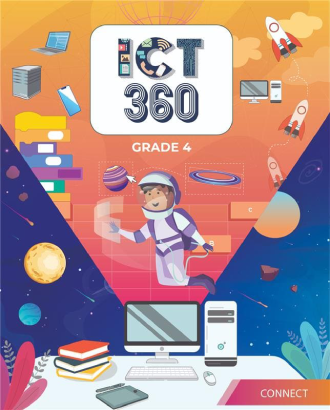
Tools & Technologies

Windows

Browser

MS Word

MS Excel

MS PowerPoint

Inkscape

ScratchJr

Blockly

Audacity

Semantris
Grade 5
Grade 5 book includes a comprehensive understanding of computer systems, including hardware, software, and operating systems. Students explore email and network connections, alongwith responsible digital citizenship.
The curriculum advances with practical applications in graphic design. They work on digital documentation with a focus on page design and creating charts and graphs. Effective presentation skills are further developed through animations and transitions. Spreadsheet formulas are introduced that significantly enhance efficiency in data analysis, whereas visual programming involves using loops and conditions to create interactive projects. Multimedia introduces the interesting field of movie making. Finally, students learn about different domains of Artificial Intelligence.
Skills Alignment
Colour Co-ordination, Observation, Problem Solving, Sequencing, Interpretation, Spatial Awareness, Logical Thinking, Logical Reasoning, Systematic Planning, Organizing Skills, Teamwork, Cooperation, Co-ordination, Interpersonal Skills, Expressions, Listening Skills, Articulation, Visual Communication, Aesthetic Sense, Visualization, Ideation, Imaginative Thinking, Composition, Unstructured Thinking
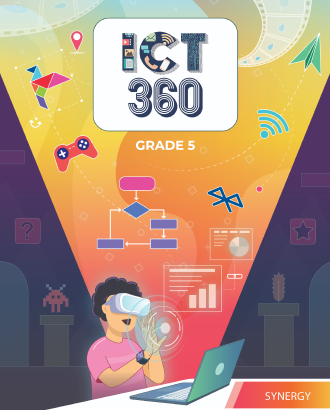
Tools & Technologies


Browser

Inkscape

MS Word

MS PowerPoint

MS Excel

AI for Oceans

ScratchJr

Openshot
Grade 6
In Grade 6, students revisit core computer fundamentals with an emphasis on key components and functionalities. They explore the uses of the internet and learn email etiquette. The curriculum includes cybersecurity topics, such as social network safety. Students create well-organized documents with advanced formatting and features like mail merge. They develop effective presentations using SmartArt and hyperlinks. Data analysis skills are expanded with more complex spreadsheet functions.
Introducing app development and basic web development equips students with skills for more advanced technology projects. Textual Programming is introduced with the concepts of algorithms, flowcharts, and introductory Python. Artificial Intelligence topics focus on foundational concepts and their applications.
Skills Alignment
Colour Co-ordination, Observation, Decision Making, Problem Solving, Sequencing, Interpretation, Spatial Awareness, Logical Thinking, Systematic Planning, Organizing Skills, Analysis, Empathy, Expressions, Articulation, Visual Communication, Aesthetic Sense, Visualization, Ideation, Composition
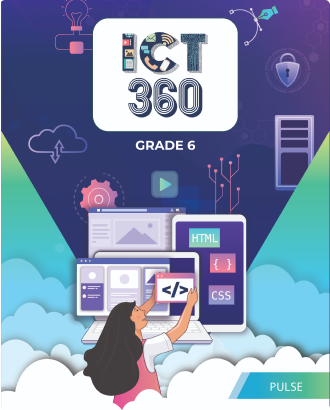
Tools & Technologies

MS Word

MS Excel

MS PowerPoint

MIT App
Inventor

VS Code

HTML

Python

ML For Kids
Grade 7
ICT360 Grade 7 advances students’ technology skills with a focus on sophisticated concepts. The course covers data management, internet and networking basics, and cloud technologies. Students delve into cybersecurity, digital citizenship, and advanced document formatting.
They engage in data analysis, learning to work with spreadsheets and create visual representations of data. The curriculum also includes user interface design principles and further explores app development and web design. Programming in Python and understanding control flow enhance students’ coding abilities. The course concludes with an introduction to database management and a primer on Artificial Intelligence and Machine Learning, preparing students for future technological challenges.
Skills Alignment
Sensory Motor Co-ordination, Colour Co-ordination, Observation, Decision Making, Problem Solving, Sequencing, Interpretation, Spatial Awareness, Logical Thinking, Systematic Planning, Organizing Skills, Analysis, Global Awareness, Empathy, Expressions, Aesthetic Sense, Visualization, Ideation, Composition
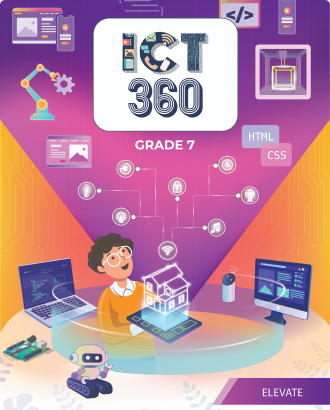
Tools & Technologies

Browser

MS Word

MS Excel

MIT App
Inventor

HTML/CSS

Libre Office Base

VS Code

Python
Grade 8
In Grade 8, students review and expand their knowledge of computer fundamentals, including data transfer, memory, and peripheral devices. They explore advanced internet concepts and networking skills. Cybersecurity topics include cryptography and its importance in securing data.
Students work on web layout design and functional coding for web applications. Programming skills are developed further with functions, modules, and problem-solving algorithms. Students learn more about managing databases and how to use queries to find information. Mechatronics design is introduced with basics of simple machines and robotics. Artificial Intelligence is studied with a focus on Natural Language Processing.
Skills Alignment
Observation, Problem Solving, Logical Thinking, Systematic Planning, Experimentation, Accuracy, Analysis, Visual Communication, Ideation, Composition, UnstructureColour Differentiation, Colour Co-ordination, Observation, Decision Making, Problem Solving, Sequencing, Interpretation, Spatial Awareness, Logical Thinking, Systematic Planning, Organizing Skills, Experimentation, Analysis, Global Awareness, Teamwork, Empathy, Aesthetic Sense, Visualization, Ideation, Composition, Unstructured Thinkingd Thinking, Aesthetic Sense, Sequencing, Organizing Skills, Pattern recognition, Decision Making.
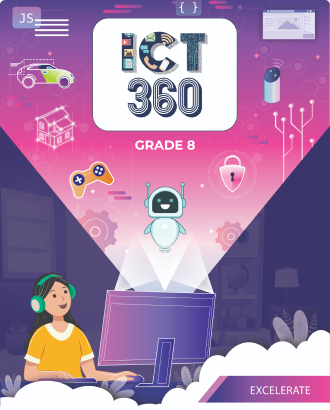
Tools & Technologies

Figma

VS Code

HTML/CSS

JS

Libre Office Base

Python

Arduino
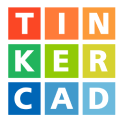
Tinkercad Circuits
Grade 9
Grade 9 delves into advanced topics in computer fundamentals, network protocols and elaborates their role in communication. Cybersecurity module includes online safety measures and ethical considerations. Web development involves creating dynamic elements, and blogging. Programming skills include handling files, data visualization, and advanced techniques.
Database management further focuses on performing queries and managing data.Students will also explore object-oriented programming with practical applications for designing and managing complex software systems. As they advance, they delve into foundational concepts in machine learning, including training models and making predictions, and explore natural language processing to understand and process human language.
Mechatronics projects involve building simple robots and integrating robotics with technology. Object Oriented Programming with Java is introduced, covering datatypes and control structures. Artificial Intelligence module involves machine learning algorithms. Entrepreneurship module is introduced as a crucial skills for today’s world that can be developed through project management activities.
Skills Alignment
Problem Solving, Sequencing, Interpretation, Spatial Awareness, Logical Thinking, Systematic Planning, Organizing Skills, Experimentation, Analysis, Global Awareness, Empathy, Visual Communication, Pattern Recognition, Visualization, Ideation, Entrepreneurial Literacy
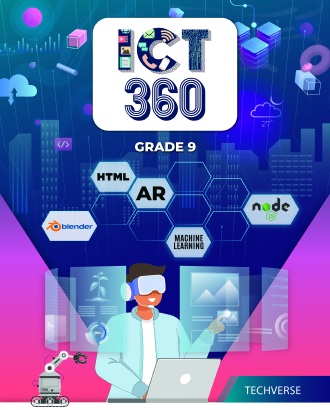
Tools & Technologies

VS Code

HTML/CSS

JS

Libre Office Base

Python

Arduino

JAVA
Grade 10
In Grade 10, students explore operating system accessibility options and advanced networking concepts. Cybersecurity topics focus on cyber ethics and responsible digital behavior. The curriculum includes advanced web development with JavaScript APIs and version control using Git. Programming skills are developed using Python libraries such as NumPy and Pandas for data analysis.
Students work on database management with forms and reports. Mechatronics design involves creating algorithms for robotics and integrating programming with mechanical systems. Object-oriented programming is advanced with modular programming and applications. Artificial Intelligence covers generative AI and its potential uses. Entrepreneurship topics include understanding intellectual property rights and their significance in technology and business.
Skills Alignment
Sensory Motor Co-ordination, Colour Differentiation, Colour Co-ordination, Spatial Awareness, Observation, Decision Making, Problem Solving, Sequencing, Interpretation, Logical Thinking, Logical Reasoning, Systematic Planning, Organizing Skills, Experimentation, Analysis, Global Awareness, Empathy, Visualization, Ideation, Imaginative Thinking, Entrepreneurial Literacy
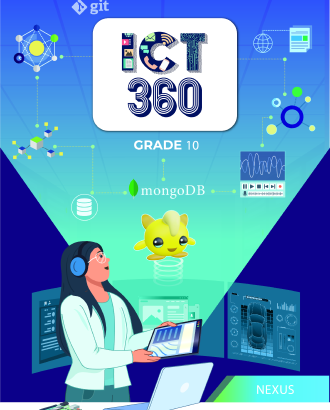
Tools & Technologies

VS Code

Git

Git Hub

Python

Libre Office Base

Arduino

JAVA
Most Advanced Computer Science ICT Curriculum Textbooks
The ICT360 books offer a comprehensive curriculum for grades 1 through 10, designed to align with National Education Policy (NEP) as well as international technical educational standards.
The curriculum progressively equips students with technology concepts, real-world applications, digital citizenship principles and future technologies. By blending theoretical knowledge with hands-on activities, the books aim to cultivate essential 21st-century skills, preparing students for higher education and future careers in technology.
Grade 1
CODE360 Grade 1 is the first book in this series, designed to help kids start their journey of coding, where logic meets creation! This book is a gateway to explore the exciting and dynamic realm of computer science through hands-on activities and engaging projects.
From building foundational logic skills to crafting interactive stories and games, each chapter is designed to ignite curiosity and empower students to build code. Unleash the potential of creative thinking and technical skills on this coding adventure!
Skills Alignment
Sensory Motor Coordination, Observation, Sequencing, Visualisation, Logical Thinking, Problem Solving, Interpretation, Analysis, Accuracy, Colour Differentiation
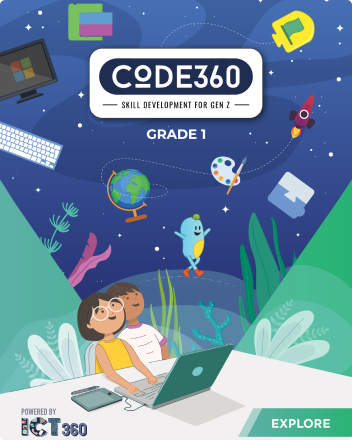
Tools & Technologies

Blockly

ScratchJr
Grade 2
CODE360 grade 2 introduces essential skills in coding and digital creativity. Students start by understanding the importance of digital security. This book guides students through a series of engaging activities.
Students explore how to bring ideas to life and create engaging character interactions. They are also introduced to simple games using block coding. Throughout the book, students enhance their problem-solving abilities, key programming and logic building skills.
Skills Alignment
Logical Thinking, Problem-solving, Observation, Decision-Making, Organizing Skill, Sequencing, Visual communication, Expressions, Imaginative Thinking, Spatial Awareness, Accuracy, Pattern Recognition, Analysis, Deductive Reasoning
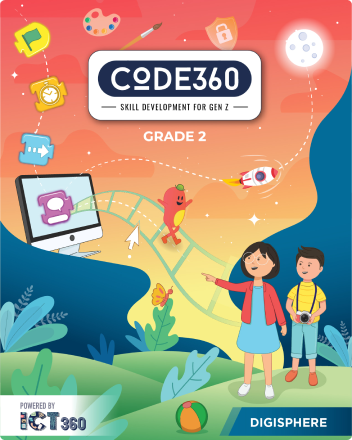
Tools & Technologies

Windows

Blockly

ScratchJr
Grade 3
CODE360 Grade 3 builds on the fundamental concepts in coding and data management with new applications. Students create animations using block-based programming. As they progress, they explore essential programming concepts that control the flow of code.
The book then moves on to data handling, where learners will learn how to organize and manage information in a simple way. It wraps up by teaching them how to turn that information into graphs and charts, making it easier to understand and analyze.
Skills Alignment
Sequencing, Coordination, Spatial Awareness, Colour Differentiation, Problem-Solving, Logical Thinking, Visual Communication, Aesthetic Sense, Composition, Organizing Skill, Systematic Planning, Observation, Decision Making.
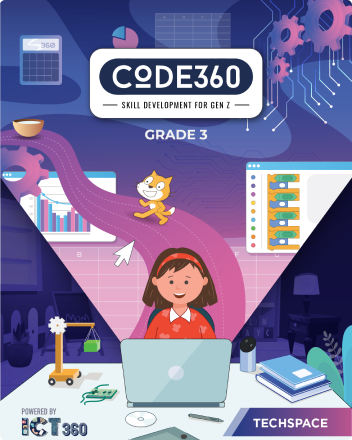
Tools & Technologies

Windows

Blockly

ScratchJr
Grade 5
CODE360 Grade 4 is a comprehensive guide to diving deeper into coding and data management. Students will explore advanced features like the Pen Extension and dive deeper into coding concepts that enable dynamic and flexible programming.
Additionally, they will build a strong foundation in data management by learning how to use Spreadsheet Formulas for calculations and data analysis. Students will also gain insights into practical applications of spreadsheets in real-world scenarios.
Skills Alignment
Problem-Solving, Sequencing, Logical Thinking, Visual Communication, Composition, Accuracy, Analysis, Systematic Planning, Organizing Skills, Deductive Reasoning, Observation
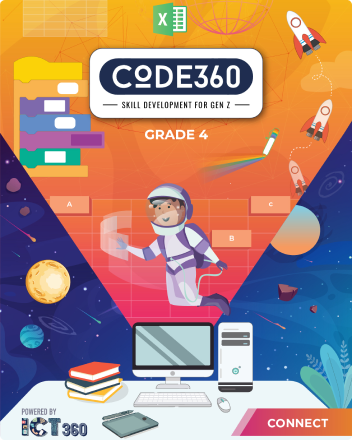
Tools & Technologies

Scratch

MS Excel
Grade 5
CODE360 Grade 5 introduces you to the world of game creation, where logic and creativity come together! You'll learn the basics of flowcharts, game mechanics, and movement in digital spaces, starting with simple games like a Paper Plane simulator and moving on to more advanced ones like Space Trip and Virus Buster. Through these fun projects, you’ll develop problem-solving skills by breaking down tasks into smaller steps. This book helps you turn your ideas into real, playable games. Get ready to explore, create, and watch your imagination come to life!
Skills Alignment
Observation, Problem Solving, Systematic Planning, Sequencing, Analysis, Logical Thinking, Visual Communication, Articulation, Imaginative Thinking, Ideation, Visualization, Aesthetic Sense, Interpretation Composition.
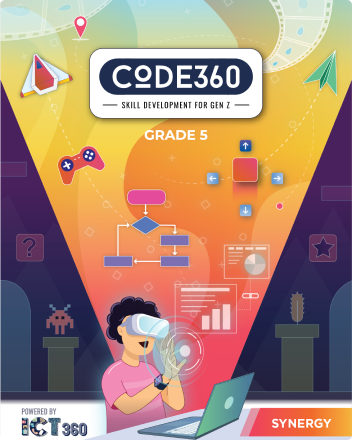
Tools & Technologies

Scratch

MS Excel
Grade 6
CODE360 Grade 6 takes you on a journey into Design Thinking and app development, where creativity meets technology! This book teaches you how to design user-friendly apps, from understanding what users need to create functional prototypes. You'll also learn essential web development skills like HTML, links, and forms, setting the stage for exploring digital spaces.
The book also introduces you to electronics, teaching you about components and circuits so you can bring your digital designs to life. With a mix of creativity, logic, and technical skills, this book gives you the tools to innovate in the digital world.
Skills Alignment
Logical Thinking, Problem-solving, Observation, Decision-Making, Organizing Skill, Sequencing, Visual communication, Expressions, Imaginative Thinking, Spatial Awareness, Accuracy, Pattern Recognition, Analysis, Deductive Reasoning
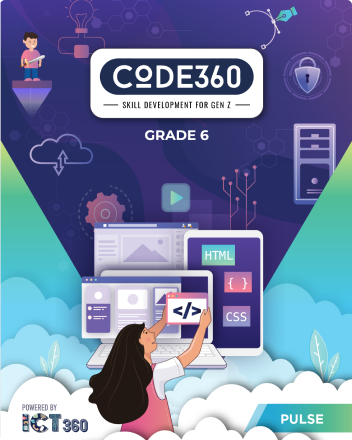
Tools & Technologies

GDevelop

Draw.IO
Grade 7
CODE360 Grade 7 takes you deeper into web development and digital design. This book teaches you about stylesheets, web layouts, and design frameworks, giving you the skills to create visually appealing and well-organized websites.You'll also learn to code 2D graphics, turning your artistic ideas into digital creations that are both beautiful and functional. As you progress, you'll explore simulations, learning how to model real-world scenarios using code.
The lessons also introduce you to important concepts like data transfer and cryptography, helping you understand how to protect and manage information online. Get ready to dive into the world of web design, creative coding, and cybersecurity!
Skills Alignment
Observation, Problem Solving, Logical Thinking, Systematic Planning, Experimentation, Accuracy, Analysis, Visual Communication, Imaginative Thinking, Ideation, Composition, Unstructured Thinking, Aesthetic Sense, Sequencing, Spatial Awareness, Organizing Skills, Pattern recognition.
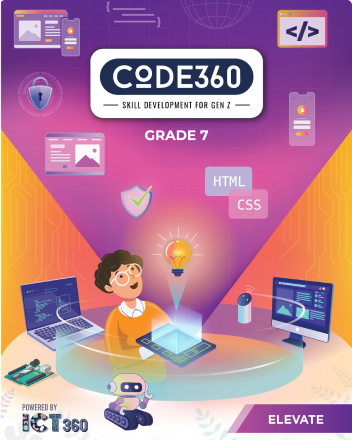
Tools & Technologies

HTML/CSS

VS Code

Bootstrap

p5.js
Grade 8
CODE360 Grade 8 is your gateway to deeper exploration in computer science, featuring hands-on activities and exciting projects that dive into functional coding, dynamic web elements, and animation techniques.
The book offers thorough coding lessons on essential topics like algorithms, sorting, and modular programming, building a strong foundation in computational thinking and programming skills. With an introduction to data management and AI, each chapter is designed to spark curiosity and help you advance your technical skills. Get ready to unlock new possibilities and take your coding expertise to the next level!
Skills Alignment
Observation, Problem Solving, Logical Thinking, Systematic Planning, Experimentation, Accuracy, Analysis, Visual Communication, Ideation, Composition, Unstructured Thinking, Aesthetic Sense, Sequencing, Organizing Skills, Pattern recognition, Decision Making.
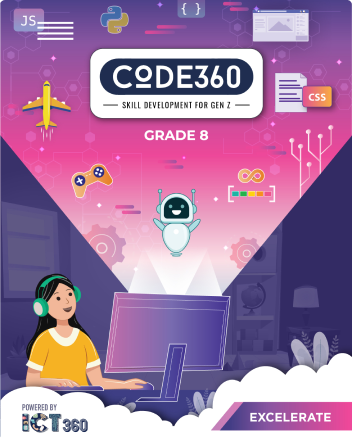
Tools & Technologies

HTML/CSS

JS

VS Code

p5.js

Python

ML for Kids
Grade 9
CODE360 Grade 9 book provides a comprehensive introduction to key concepts in modern programming and data science. Students start with the basics of server-side application development, learning to build and manage dynamic web applications. They explore creating interactive web forms and integrating real-time data from external sources.
Students will also explore object-oriented programming with practical applications for designing and managing complex software systems. As they advance, they delve into foundational concepts in machine learning, including training models and making predictions, and explore natural language processing to understand and process human language.
Skills Alignment
Observation, Problem Solving, Logical Thinking, Systematic Planning, Accuracy, Visual Communication, Ideation, Composition, Unstructured Thinking, Sequencing, Organizing Skills, Pattern recognition, Decision Making.
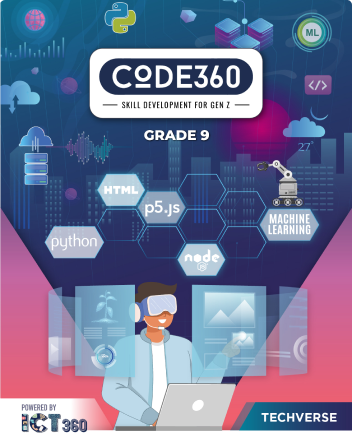
Tools & Technologies

HTML/CSS

JS

VS Code

Node JS

p5.js

Python
Grade 10
This Grade 10 book, the final in the ICT360 curriculum, equips students with advanced digital skills vital for today’s tech-driven world. Students will master designing dynamic websites, managing databases, and utilizing version control—key components of modern software development. The hands-on projects guide them through creating interactive multimedia applications and understanding the algorithms behind procedural animations.
The curriculum also delves into relational database management and introduces foundational concepts in machine learning, ensuring students build a solid grasp of both current and emerging technologies. This comprehensive approach prepares them for the future of digital innovation.
Skills Alignment
Observation, Problem Solving, Logical Thinking, Systematic Planning, Accuracy, Visual Communication, Ideation, Composition, Unstructured Thinking, Sequencing, Organizing Skills, Pattern recognition, Decision Making, Empathy, Visualization, Aesthetic Sense.
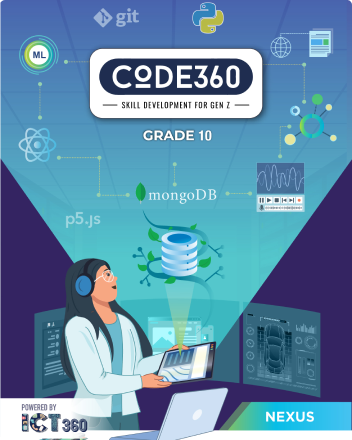
Tools & Technologies

Node JS

React JS

Mongo DB

p5.js

MySQL


